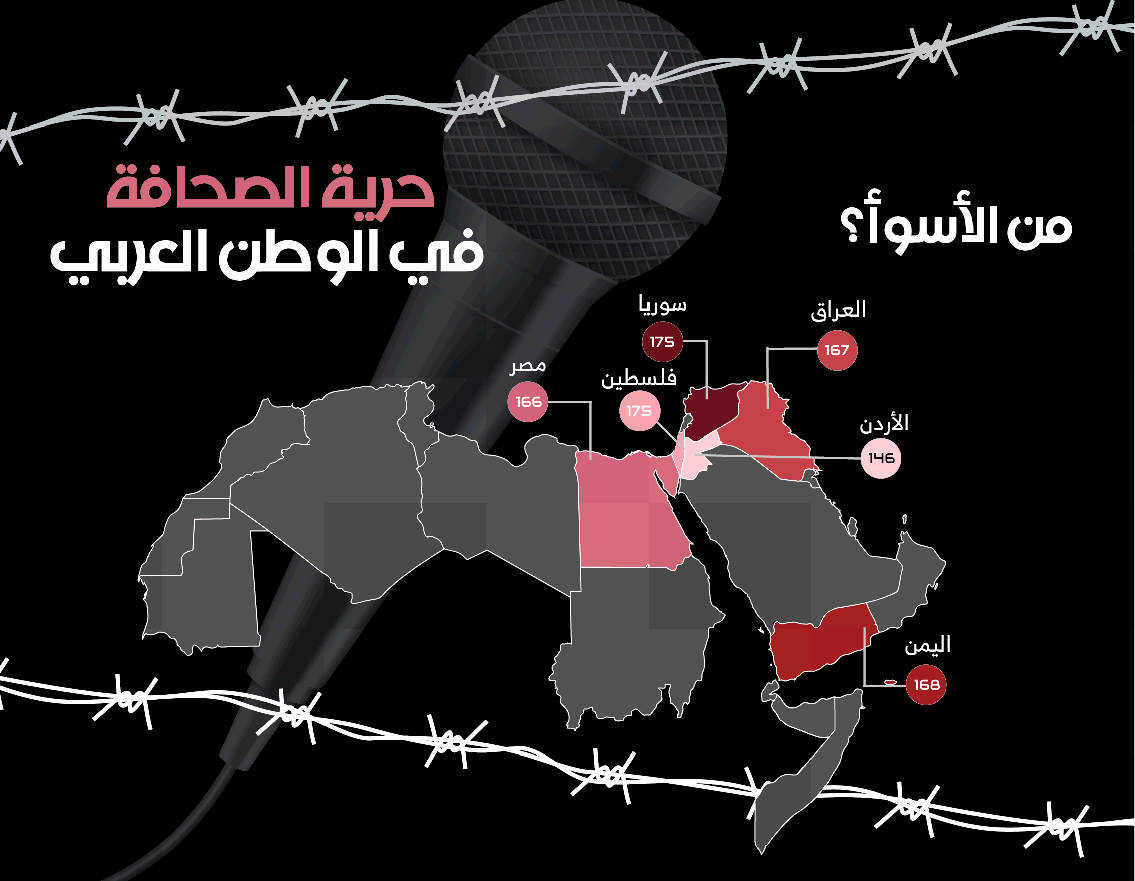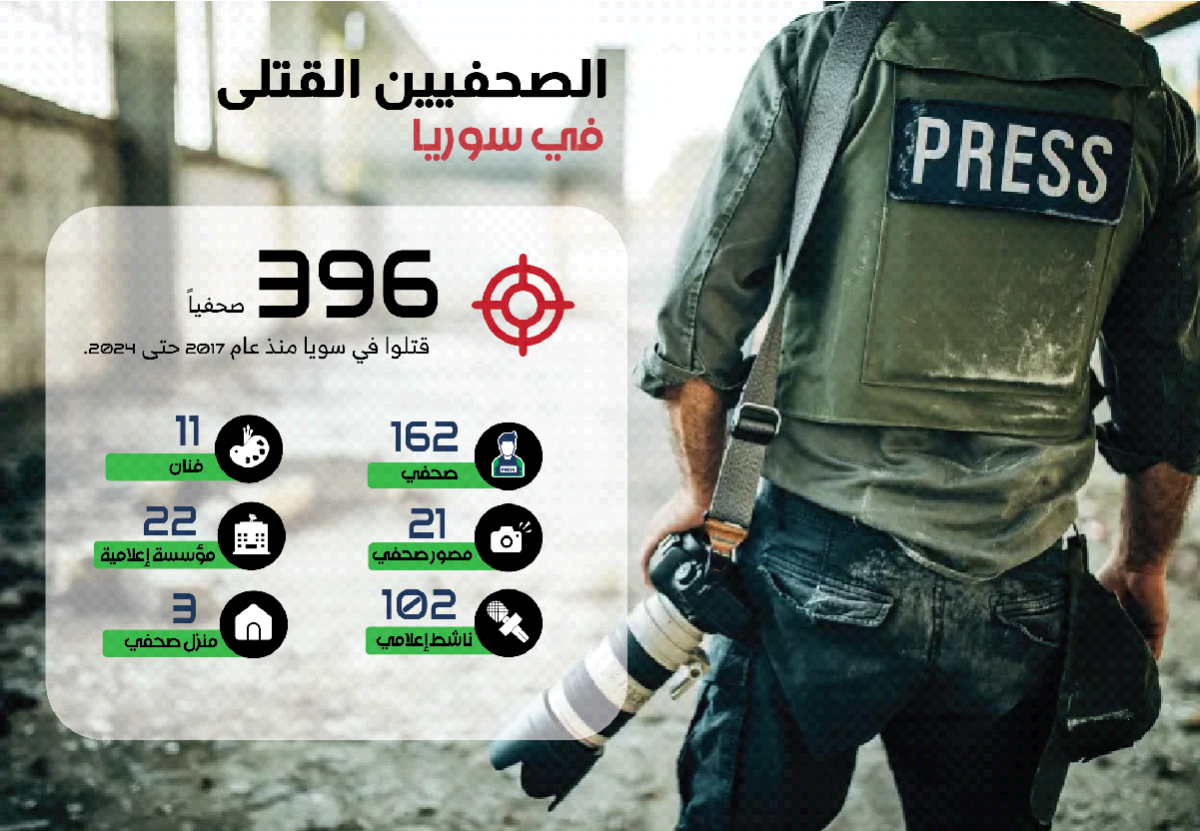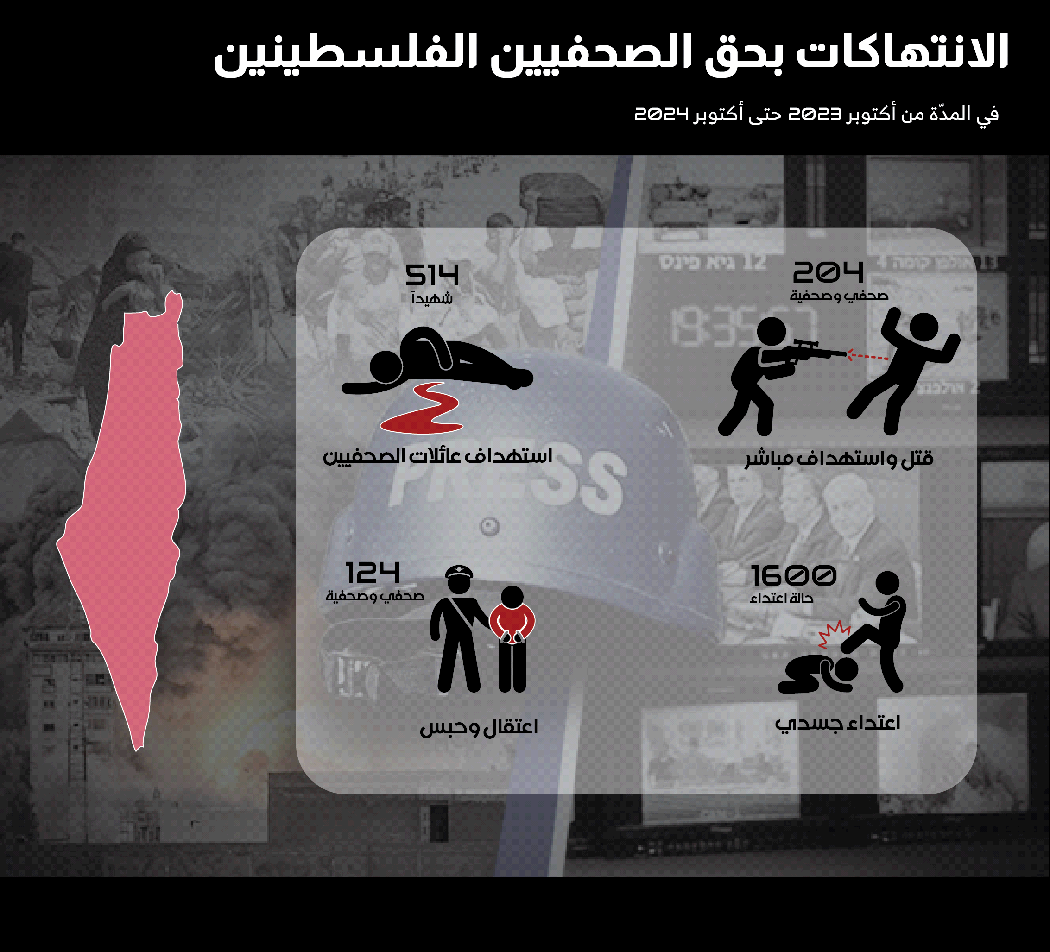Borderless Testimonies: Journalism as a Ticket to Exile or Death

"It takes stamina–keep your spirits high.” Do you remember those words?
The words of war correspondent Shireen Abu Akleh are impossible to forget. She was killed by bullets fired by Israeli occupation forces while reporting in the field. Her story is not hers alone—it is the story of every journalist who never imagined that their profession could lead to death, threats, or forced exile.

These dangers and tragic realities are not random. The Middle East and North Africa (MENA) region is considered one of the most dangerous areas for journalists. The 2023 World Press Freedom Index, published by Reporters Without Borders (RSF), classifies the situation in more than half of the region’s countries as “very serious”.
Syria ranked 175th, Yemen 168th, and Iraq 167th—countries where a high number of journalists are either missing or being held hostage. While Palestine advanced 14 places to rank 156th, the security situation for journalists remains dire. In 2022 alone, several journalists were killed by Israeli forces, and targeted assassinations continued during the most recent war on Gaza. Egypt ranked 166th out of 180 countries, while Jordan came in at 146th on the same index.

These rankings reflect a troubling reality—one that journalists themselves affirm through their daily experiences in the field. Their testimonies paint a grim picture of deteriorating press freedoms, marked by tight restrictions on freedom of expression, legal persecution, and direct threats to their safety. Journalists also report systematic censorship, difficulties in accessing information, and the physical dangers they face while covering events on the ground.
Yemen: Najm Qassem — From an International Award to Exile
Yemeni journalist Najm Qassem began his career in journalism during his second year at the Faculty of Media at Sana'a University in 2019, amid a climate of intense political polarization caused by the ongoing war that erupted in Yemen in 2015. In the midst of this turmoil, Najm witnessed serious human rights violations that went largely unreported—ignored, as if they had never happened.
“I was disillusioned,” says Najm Qassem, a journalist barely 22 years old. He started his journey with a belief in the power of honest journalism, convinced that press freedom and truth-telling were keys to ending the conflict, or at least a path toward rebuilding the nation he has always loved.
Qassem reflects on his experience, saying: “We saw the war and its violations with our own eyes, but they were never addressed—they were completely ignored.” He sees this silence as a form of evading responsibility and exacerbating injustice against the victims of this war, particularly in areas controlled by what he describes as “a terrorist group that wants no voice but its own.”
Despite winning fourth place in the Thomson Reuters Foundation Award for his investigative report “Women Prisoners in Yemen,” Qassem was forced to flee the country by 2022. Remaining in Yemen became impossible under direct threats to his life and his family’s safety. “I had no choice but to leave,” he explains.
When asked about the main reason for his departure, Qassem simply said, “I can’t explain the reason, but it was an urgent and serious security threat.”
In an attempt to escape the danger, Qassem moved to Aden, but to no avail. The military threats followed him, forcing him to leave Yemen for good. The next two and a half years were a grueling experience travelling through several Arab countries, including Lebanon, Egypt, and Jordan. “I was mentally and financially exhausted to a degree I can’t even describe,” he emphasized.
On the situation of journalists in Yemen, Qassem paints a bleak picture of press freedom, stressing that “There is no such thing as a journalist who has broken the law or faced charges. What we face is assassination, kidnapping, enforced disappearance, and arbitrary detention.” He points out that over 60 journalists have been killed in Yemen over the past ten years, while many others remain in prison or missing—their families forbidden from visiting or even knowing their whereabouts.
Qassem recalls the period before the war, when Yemeni journalism held significant power and influence. He describes it as “the boldest and strongest” in the Arab world, representing a true Fourth Estate that gave voice to the people. However, this scene began to change after the assassination of the first journalist in 2011 in Change Square by the Houthis. Since then, death sentences have been handed down to dozens of journalists by unconstitutional courts, forcing many to abandon the profession to protect their own lives and those of their families.
After leaving Yemen, Qassem lost his job and his mental health suffered, making it difficult for him to continue his journalism career. Today, he lives in a European country under a training program, but he has no plans to return to Yemen or resume his journalism career at this time.
He ends his reflection with these poignant words: “I would prefer not to be alone, far from my family and my country, but my return would mean my arrest or disappearance.”
Qassem’s story highlights the harsh realities faced by journalists in the Arab world, where increasing threats to their lives and freedoms arise due to their work in uncovering the truth and reporting on what is happening on the ground. Despite the unique experiences of each journalist, the common thread among them is the repression and persecution they face, directly contributing to the decline in press freedom in their countries. This reality has been confirmed by the experiences of journalists in both Iraq and Jordan.
Iraq: Journalism in the Face of Militias
Iraqi journalist Haider Mousa began his career in 2018 as a correspondent for a news agency. However, his work covering the October 2019 protests and the subsequent crackdown targeting journalists forced him to leave Iraq and move to Lebanon after receiving death threats from armed militias.
Mousa explains: “I left Iraq after receiving direct threats due to my reporting on the murder of 800 young people by militias. I didn’t receive any direct threats from the authorities, but the official crackdown created an environment that enabled these groups.”
Mousa informed the international organizations he worked with about the threats, and fled Iraq to protect his life. However, he insists that “what happened didn’t stop me from continuing my work and pushing the boundaries of my freedom.” Today, he resides in Lebanon on a tourist visa that is renewed periodically, but he has no plans to return to his country. He believes that continuing his work in Iraq would only threaten his life.
Mousa points out that the space for freedoms in Iraq has been steadily shrinking, as enforced disappearances and the displacement of journalists continue to be a reality. He also expresses concern about the potential passing of the Cybercrime Law in the Iraqi parliament, which he views as an additional tool to restrict freedoms, similar to what was passed in Jordan.
Jordan: The Cybercrime Law as a Restriction of Press Freedom
Jordan is not exempt from this trend toward restricting journalists' rights. Despite recommendations from the Higher Council for Human Rights not to prosecute journalists except under the Press and Publications Law, the Cybercrime Law, passed in 2015 and amended in 2023, has become a legal tool to narrow the space for freedom of expression.
Jordanian lawyer Loay Obeidat explains that the Cybercrime Law is vague and imposes harsher penalties for crimes committed via electronic means compared to the Penal Code. He adds, “A cybercrime is one that can only be committed through digital media, such as hacking, so criticism or defamation cannot be considered a cybercrime. However, the law uses vague terms like ‘truth,’ ‘national unity,’ and ‘sedition’ to restrict free speech.”
Obeidat further points out that the law includes provisions criminalizing the publication and circulation of information, granting broad powers to the public prosecution without judicial oversight. This fosters an atmosphere of fear that drives society away from the digital space and leads to a decline in freedom of expression due to the fear of legal consequences.
One of the most controversial cases of cybercrime trials was that of satirical journalist Ahmad Hassan Al-Zoubi in 2023. The Amman Magistrate Court sentenced him to one year in prison and a fine due to a post he made during a truckers' strike in the Ma'an Governorate.
Al-Zoubi explains, “The ruling was issued against me in June 2023, but it wasn’t implemented until July 2024.” Although he was acquitted of the post itself, the court convicted him due to the comments made on it. He reveals that his defense lawyer filed seven appeals, and only the last one was accepted two months before the end of his sentence, replacing the remaining period with community service at the Directorate of Tourism and Antiquities.
The suffering didn’t stop at imprisonment; he was also fired from Al-Rai newspaper after 19 years because of his period of absence. Al-Zoubi remarks, “I filed a wrongful dismissal case, but it seems this was their way of getting rid of me.” Despite these pressures, he affirms that what he endured will not stop him from continuing his work.
“Life has no meaning without freedom,” he said.
Egypt: Legal Restrictions and Heightened Security
In Egypt, the situation is not much different from Jordan. Although Article 70 of the Egyptian Constitution guarantees freedom of the press, Media Regulation Law No. 180, added in 2018, imposes strict restrictions on these freedoms. The law grants the Supreme Council for Media Regulation broad authority to block websites, blogs, and electronic accounts—an explicit violation of Article 71 of the Constitution—making the Council the third body to hold such powers, after investigative and law enforcement authorities.
In this context, the Arab Observatory for Media Freedom documented the presence of 46 Egyptian journalists and media professionals behind bars, including 32 held in pretrial detention on charges such as spreading false news and belonging to banned groups. The report noted that most of these individuals have exceeded the legal limit for pretrial detention (two years), but the authorities recycle cases to keep them in custody.
The Observatory also pointed to 14 cases in which individuals are serving judicial sentences, some of which include the death penalty, life imprisonment, or several years of incarceration. Others have completed their prison sentences but remain in detention.
Among them is journalist Moataz Wardan, who was arrested in February 2018 after conducting an interview with lawyer and activist Hisham Geneina. Wardan faced charges including “inciting against the state and spreading false news,” but he asserted that he did not distort or fabricate any of Geneina’s statements, nor did he publish any falsehoods. “Geneina himself never denied the interview or accused me of distortion—yet I was imprisoned.”
After spending more than 26 months in pretrial detention—beyond the legal limit set by Egyptian law—Wardan was released in May 2020. However, instead of gaining his freedom, he was immediately charged in a separate but similar case, a practice known in Egypt as “case recycling.” This tactic allows authorities to reset the pretrial detention clock by filing new charges that mirror the original ones, effectively keeping detainees imprisoned indefinitely without trial. “I spent time in solitary confinement and saw things I can never forget,” he said.
Wardan and his family were eventually forced to leave Egypt and immigrate to a Western country, especially after losing his job due to media organizations’ fear of working with him. Nevertheless, he affirms: “Journalism is a mission, and it must continue despite all obstacles.”

Syria: The Most Dangerous Environment for Journalists
In Syria, the reality for journalists goes beyond restrictions—it is one of the most dangerous environments for media professionals. The Skeyes Center for Media and Cultural Freedom documented the killing of 396 journalists between 2017 and 2024. The tally includes 162 journalists, 21 photographers, 11 artists, 102 media activists, in addition to the targeting of three journalists’ homes and 22 media institutions.
Syrian journalist Mohammad Fattah recounts the tragic reality he experienced in Idlib before being forced to leave his homeland in 2019, when his life was threatened by the violent security campaign in the region. “We were under threat of death from the regime and its factions. Journalists' coverage zones were targeted, which led to the killing of our colleagues,” he said.
The persecution of journalists became almost a daily occurrence through home raids and surveillance, ultimately forcing Fattah to flee Syria with his colleagues, aided by Reporters Without Borders. Despite the danger, he refused to apply for political asylum. Today, Mohammad lives in a European country with relative safety but still carries a strong desire to return to his homeland one day.

Formal Protection: International Law Fails to Safeguard Journalists in War and Peace
Dr. Imran Muhafatha, an expert in international law, emphasizes that international legislation guarantees the protection of journalists' freedoms through two main pathways.
The first pertains to protection during armed conflicts. International humanitarian law provides indirect protection for journalists in times of war, classifying them under the Fourth Geneva Convention as civilians—thus granting them the same legal protections afforded to civilian populations. Additionally, the First Additional Protocol to the Geneva Conventions explicitly ensures direct protection for journalists, provided they do not engage in any actions that compromise their civilian status.
Article 79 of this protocol affirms that journalists performing their professional duties in conflict zones are considered civilians and must be protected under international agreements, as long as they do not take part in hostilities.
The second pathway applies to peacetime, under international human rights law. International charters uphold press freedom as part of the broader right to freedom of opinion and expression. This includes the right to seek, receive, and impart information without restrictions. Any violation of these principles constitutes a clear breach of international standards.
Palestine: A Stark Example of Legal Failure
Nowhere is the failure to uphold these legal protections more apparent than in Palestine. Despite an improvement in Palestine’s ranking on the 2023 World Press Freedom Index—rising 14 spots to 156th—conditions for journalists remain dangerous. Two Palestinian journalists were killed by Israeli forces in 2020, and press safety continues to decline.
Recent figures from the Palestinian Journalists Syndicate—documenting violations from October 2023 to October 2024—reveal that over 1,600 crimes and attacks were committed against Palestinian journalists. This includes the arrest of 124 journalists (male and female) and the killing of 514 family members of journalists.
During one year of Israel’s war on the Gaza Strip, 204 journalists and media workers were killed, with the number rising to 209 after Israel resumed military operations following a ceasefire. The majority of victims were directly targeted, and many media institutions were destroyed. Journalists were forced to flee their homes after their residences were bombed and family members killed.
Journalist Rana Ahmad, based in Gaza, says the targeting of journalists following the events of October 7 was unprecedented—encompassing direct attacks, arrests, and smear campaigns online. Despite being just 23 years old, Rana has faced direct threats that forced her to relocate multiple times and temporarily stop working for her safety. Still, she refuses to abandon her mission, saying: “This is our land... Palestine.”
These harrowing accounts—from Qasem, Haidar, Al-Zoubi, Wardan, Fattah, and many other Arab journalists—reveal how journalism has become a perilous profession across the region. Under repressive legislation, authoritarian political environments, and international laws that fall short in protecting them, the space for media freedom in the Arab world continues to shrink. And as it does, the voice of truth becomes ever more vulnerable to silence.
This report was produced with the support of the European Union as part of the Fellowship on the Impact of Conflicts and Wars on Journalism and Media Coverage. The content does not necessarily reflect the views of the European Union.











































